#les essais
Text


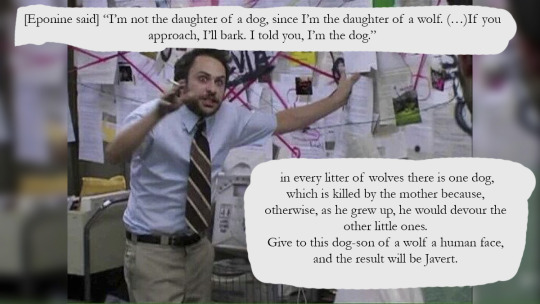

Feeling normal about Javert and Eponine today
#les mis#les mis letters#lm 5.1.19#im very normal about em#i was going to write an essay about them for today#but have this instead#javert-eponine parallels#javert/eponine parallels
5K notes
·
View notes
Text
Il ne faut pas s'attacher si fort à ses propres goûts et son tempérament. Notre principal talent, c'est de savoir nous appliquer à différentes occupations. C'est exister, ce n'est pas vivre que de se tenir attaché et lié nécessairement à une seule façon d'être. Les plus belles âmes sont celles qui ont le plus de variété et de souplesse.
Chapitre III, Livre III, Les Essais, Michel de Montaigne
0 notes
Text
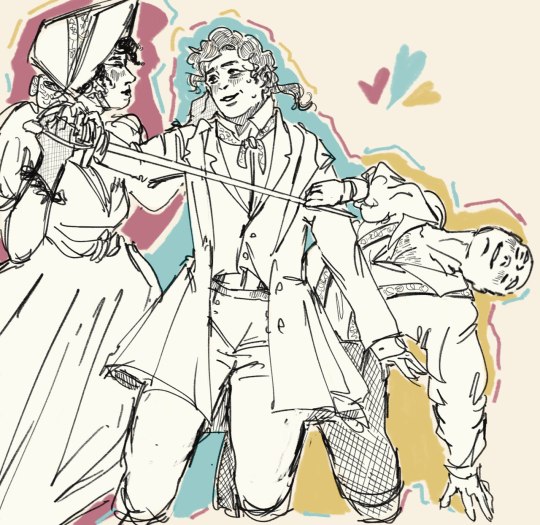
J/B/M
—I am wild over her.
Reference pic below, though I'm sure all the gay ppl on this site has seen it before:

#this will unfortunately be my only JBM contribution 😪#i have 3 essays to write and a luggage to pack 😭#so i hope you guys like this 🥺#JBM week 2024#joly#bossuet#musichetta#les mis#les mis fanart#syrup art tag
308 notes
·
View notes
Text

Video essayists my beloveds
#for my autistic ass that needs constant noise in the background when doing tasks#memes#video essay#shanspeare#mina le#gabi belle#madisyn brown#black fem#youtube
211 notes
·
View notes
Text
Me, rambling to my wife about this crackpot theory I came up with in the shower about how Les Miserables may have been an answer to The Count of Monte Cristo, or at least could be read as such: ... But then Valjean didn't personally screw Javert over like Dantes' enemies did-
My wife: Are you sure Valjean didn't screw Javert? I thought I read that on AO3 once.
#the train of thought leading up to my statement was whether it was Valjean one could read as a foil to Dantes or Javert#'cause of Javert's whole obsession with bringing Valjean to justice#bookblr#les miserables#the count of monte cristo#anyway nothing's gonna come of this crackpot theory of mine 'cause I am no longer in school and have no more essays to write#but by golly this would be a delicious topic to write a big ol' thesis style paper on#still an English major nearly 10 years out of cool leg apparently#well both these books are French but still#OKAY BUT LISTEN the two authors were contemporaries#and maybe arguably friends? according to the bio sketch of dumas in the intro of my CoMC copy?#I would have to do more research on their relationship and also whenabouts each was writing their respective thing#cause iirc aren't both books set around the same time period as well (mid-19th century) with a lot of the action being in Paris?#anyway right#ignore me and my nerdy nerdy book thoughts#these have been rambling tags with usagi
81 notes
·
View notes
Text
yeah. enjolras and grantaire are foils (belief vs. cynicism). but so are enjolras and combeferre (logic vs. philosophy) and enjolras and valjean (justice vs. mercy) and enjolras and javert (revolution vs. rule of law) and enjolras and eponine (privilege vs. poverty) and enjolras and montparnasse (altruistic beauty vs. selfish beauty) and-
#enjolras has SO MANY FOILS OK#this man is a walking symbolism essay#enjolras#les miserables#les amis#character foils#les mis#pigeon.txt
1K notes
·
View notes
Text
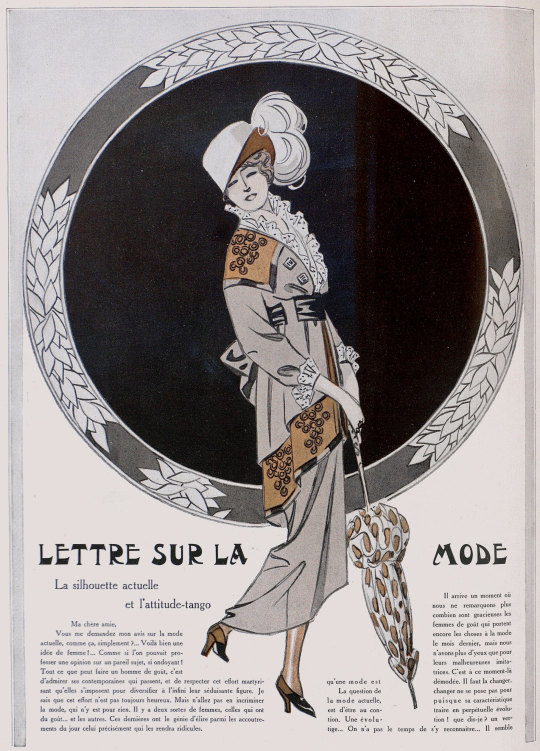
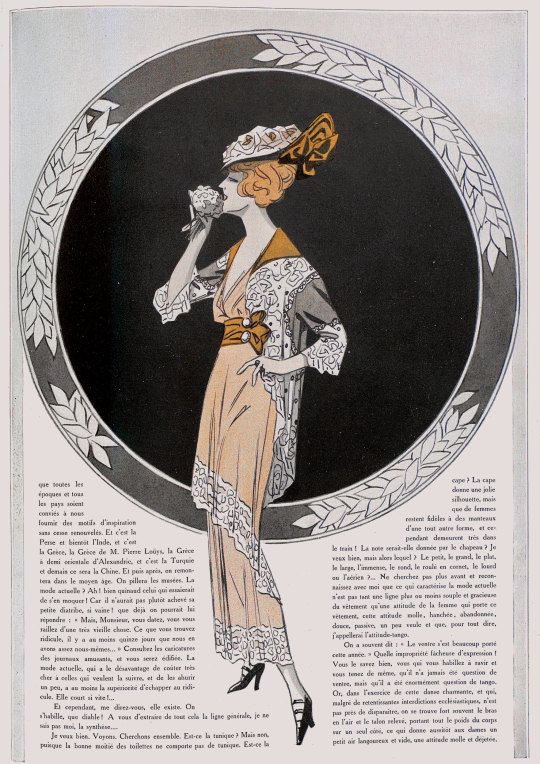
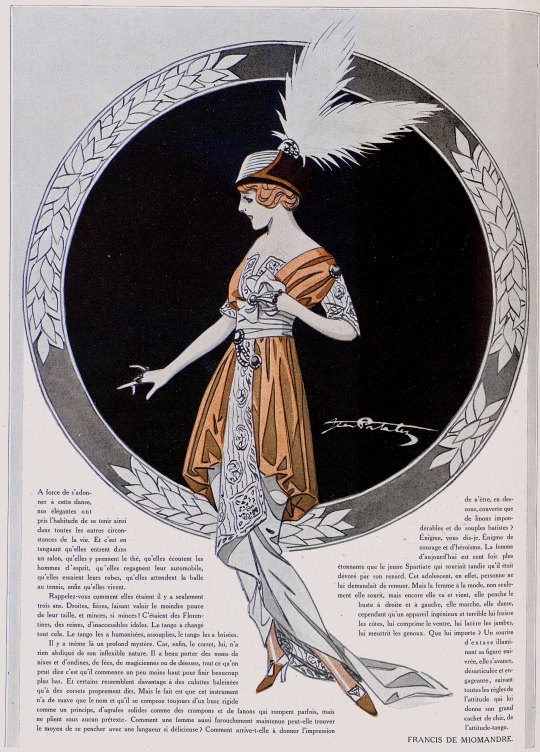
Les Modes : revue mensuelle illustrée des arts décoratifs appliqués à la femme, no. 163, juillet 1914, Paris. "Lettre sur la mode: La silhouette actuelle et l'attitude-tango." Francis de Miomandre. Bibliothèque nationale de France
English translation by Google Translate (and edited for relative clarity).
Ma chère amie,
Vous me demandez mon avis sur la mode actuelle, comme ça, simplement?… Voilà bien une idée de femme!… Comme si Fou pouvait professer une opinion sur un pareil sujet, si ondoyant! Tout ce que peut faire un homme de goût, c'est d'admirer ses contemporaines qui passent, et de respecter cet effort martyrisant qu'elles t'imposent pour diversifier à l'infini leur séduisante figure. Je sais que cet effort n'est pas toujours heureux. Mais n'allez pas en incriminer la mode, qui n'y est pour rien. Il y a deux sortes de femmes, celles qui ont du goût… et les autres. Ces dernières ont le génie d'élire parmi les accoutrements du jour celui précisément qui les rendra ridicules.
Il arrive un moment où nous ne remarquons plus combien sont gracieuses les femmes de goût qui portent encore les choses à la mode le mois dernier, mais nous n'avons plus d'yeux que pour leurs malheureuses imitatrices. C'est à ce moment-là qu'une mode est démodée. Il faut la changer.
La question de changer ne se pose pas pour la mode actuelle, puisque sa caractéristique est d'etre au contraire en perpétuelle évolution. Une évolution! que dis-je? un vertige… On n'a pas le temps s'y reconnaitre… Il semble que toutes les les pays soient conviés à nous fournir des motifs d'inspiration sans cesse renouvelés. Et c'est la Perse et bientôt l'Inde, et c'est la Grèce, la Grèce de M. Pierre Loüys, la Grèce à demi orientale d'Alexandrie, et c'est la Turquie et demain ce sera la Chine. Et puis après, on remontera dans le moyen âge. On pillera les musées. La mode actuelle? Ah! bien quinaud celui qui essaierait de s'en moquer! Car il n'aurait pas plutôt achevé sa petite diatribe, si vaine ! que déjà on pourrait lui répondre: « Mais, Monsieur, vous datez, vous vous raillez d'une très vieille chose. Ce que vous trouvez ridicule, il y a au moins quinze jours que nous en avons assez nous-mêmes… » Consultez les caricatures des journaux amusants, et vous serez édifiée. La mode actuelle, qui a le désavantage de coûter très cher à celles qui veulent la suivre, et de les ahurir un peu, a au moins la supériorité d'échapper au ridicule. Elle court si vite!…
Et cependant, me direz-vous, elle existe. On s'habille, que diable ! A vous d'extraire de tout cela la ligne générale, je ne sais pas moi, la synthèse…
Je veux bien. Voyons. Cherchons ensemble. Est-ce la tunique ? Mais non, puisque la bonne moitié des toilettes ne comporte pas de tunique. Est-ce la cape? La cape donne une jolie silhouette, mais que de femmes restent fidèles à des manteaux d'une tout autre forme, et cependant demeurent très dans le train! La note serait-elle donnée par le chapeau? Je veux bien, mais alors lequel? Le petit, le grand, le plat, le large, l'immense, le rond, le roulé en cornet, le lourd ou l'aérien?… Ne cherchez pas plus avant et reconnaissez avec moi que ce qui caractérise la mode actuelle n'est pas tant une ligne plus ou moins souple et gracieuse du vêtement qu'une attitude de la femme qui porte ce vêtement, cette attitude molle, hanchée, abandonnée, douce, passive, un peu veule et que, pour tout dire, j'appellerai l'attitude-tango.
On a souvent dit: « Le ventre s'est beaucoup porté cette année. » Quelle impropriété fâcheuse d'expression! Vous le savez bien, vous qui vous habillez à ravir et vous tenez de même, qu'il n'a jamais été question de ventre, mais qu'il a été énormément question de tango. Or, dans l'exercice de cette danse charmante, et qui, malgré de retentissantes interdictions ecclésiastiques, n'est pas près de disparaître, on se trouve fort souvent le bras en l'air et le talon relevé, portant tout le poids du corps sur un seul côté, ce qui donne aussitôt aux dames un petit air langoureux et vide, une attitude molle et déjetée.
A force de s'adonner à cette danse, nos élégantes ont pris l'habitude de se tenir ainsi dans toutes les autres circonstances de la vie. Et c'est en tanguant qu'elles entrent dans un salon, qu'elles y prennent le thé, qu'elles écoutent les hommes d'esprit, qu'elles regagnent leur automobile, qu'elles essaient leurs robes, qu'elles attendent la balle au tennis, enfin qu'elles vivent.
Rappelez-vous comment elles étaient il y a seulement trois ans. Droites, fières, faisant valoir le moindre pouce de leur taille, et minces, si minces ! C'étaient des Florentines, des reines, d'inaccessibles idoles. Le tango a changé tout cela. Le tango les a humanisées, assouplies, le tango les a brisées.
Il y a même là un profond mystère. Car, enfin, le corset, lui, n'a rien abdiqué de son inflexible nature. Il a beau porter des noms de nixes et d'ondines, de fées, de magiciennes ou de déesses, tout ce qu'on peut dire c'est qu'il commence un peu moins haut pour finir beaucoup plus bas. Et certains ressemblent davantage à des culottes baleinées qu'à des corsets proprement dits. Mais le fait est que cet instrument n'a de suave que le nom et qu'il se compose toujours d'un buse rigide comme un principe, d'agrafes solides comme des crampons et de fanons qui rompent parfois, mais ne plient sous aucun prétexte. Comment une femme aussi farouchement maintenue peut-elle trouver le moyen de se pencher avec une langueur si délicieuse? Comment arrive-t-elle à donner l'impression de n'être, en dessous, couverte que de linons impondérables et de souples batistes? Énigme, vous dis-je. Enigme de courage et d'héroïsme. La femme d'aujourd'hui est cent fois plus étonnante que le jeune Spartiate qui souriait tandis qu'il était dévoré par son renard. Cet adolescent, en effet, personne ne lui demandait dé remuer. Mais la femme à la mode, non seulement elle sourit, mais encore elle va et vient, elle penche le buste à droite et à gauche, elle marche, elle danse, cependant qu'un appareil ingénieux et terrible lui froisse les côtes, lui comprime le ventre, lui lacère les jambes, lui meurtrit les genoux. Que lui importe ? Un sourire d'extase illuminant sa figure enivrée, elle s'avance, désarticulée et engageante, suivant toutes les règles de l'attitude, qui lui donne son grand cachet de chic, de l'attitude-tango.
—
My dear friend,
You ask me my opinion on current fashion, just like that?… That's a woman's idea!… As if Fou could profess an opinion on such a subject, so undulating! All a man of taste can do is admire his passing contemporaries, and respect this tormenting effort that they impose on you to infinitely diversify their seductive figure. I know that this effort is not always successful. But don't blame fashion, which has nothing to do with it. There are two kinds of women, those who have taste… and those who don't. The latter have the genius to choose from among the outfits of the day precisely the one that will make them look ridiculous.
There comes a time when we no longer notice how graceful the women of taste are who still wear fashionable things last month, but we only have eyes for their unfortunate imitators. That’s when a fashion goes out of fashion. It needs to be changed.
The question of changing does not arise for current fashion, since its characteristic is, on the contrary, to be in perpetual evolution. An evolution! what did I say? a dizziness… We don't have time to relate… It seems that all countries are invited to provide us with constantly renewed sources of inspiration. And it is Persia and soon India, and it is Greece, the Greece of Mr. Pierre Loüys, the semi-eastern Greece of Alexandria, and it is Turkey and tomorrow it will be China. And then afterwards, we will go back to the Middle Ages. We will loot the museums. Current fashion? Ah! very stupid anyone who tries to make fun of it! Because he would not have sooner finished his little diatribe, so vain! that one could already reply to him: “But, Sir, you are dating, you are making fun of a very old thing. What you find ridiculous, we have had enough of it ourselves for at least a fortnight…" Look at the caricatures in the amusing newspapers, and you will be edified. Current fashion, which has the disadvantage of being very expensive for those who want to follow it, and of bewildering them a little, at least has the superiority of escaping ridicule. She runs so fast!…
And yet, you will tell me, it exists. Let's get dressed, damn it! It's up to you to extract the general line from all this, I don't know, the synthesis…
I don't mind. Let's see. Let's search together. Is it the tunic? But no, since a good half of the toilets do not have a tunic. Is it the cape? The cape gives a pretty silhouette, but how many women remain faithful to coats of a completely different shape, and yet remain very in tune! Would the score be given by the hat? I'm willing, but which one? The small, the large, the flat, the wide, the immense, the round, the rolled into a cone, the heavy or the airy?… Look no further and agree with me that what characterizes current fashion is not so much a more or less supple and graceful line of the garment as an attitude of the woman who wears this garment, this soft, hip, abandoned, gentle, passive, a little spineless attitude and which, to tell the truth, I'll call it attitude-tango.
It has often been said: “The stomach has worn a lot this year." What an unfortunate impropriety of expression! You know well, you who dress beautifully and carry yourself the same, that it was never a question of stomach, but that it was very much a question of tango. Now, in the exercise of this charming dance, which, despite resounding ecclesiastical prohibitions, is not about to disappear, one very often finds oneself with one's arm in the air and one's heel raised, carrying the entire weight of one's body, on one side only, which immediately gives the ladies a little languorous and empty air, a limp and lopsided attitude.
By devoting themselves to this dance, our elegant ladies have gotten into the habit of holding themselves like this in all other circumstances of life. And it is while swaying that they enter a salon, that they take tea there, that they listen to men of wit, that they return to their car, that they try on their dresses, that they wait the tennis ball, finally let them live.
Remember how they were just three years ago. Straight, proud, showing off every inch of their waist, and thin, so thin! They were Florentines, queens, inaccessible idols. Tango changed all that. Tango humanized them, softened them, tango broke them.
There is even a deep mystery there. Because, finally, the corset has not abdicated any of its inflexible nature. It may bear the names of nixes and undines, fairies, magicians or goddesses, all we can say is that it starts a little lower and ends much lower. And some look more like boned panties than actual corsets. But the fact is that this instrument is sweet only in name and that it always consists of a nozzle as rigid as a principle, of solid staples like crampons and of baleen which sometimes break, but do not bend under any circumstances. Pretext. How can such a fiercely held woman find a way to bend over with such delicious languor? How does it manage to give the impression of being, underneath, covered only with imponderable lawns and soft cambric? Enigma, I tell you. Riddle of courage and heroism. The woman of today is a hundred times more astonishing than the young Spartan who smiled as he was devoured by his fox. This teenager, in fact, no one asked him to move. But the fashionable woman not only smiles, but also comes and goes, she leans her bust to the right and to the left, she walks, she dances, while an ingenious and terrible device crumples her ribs, compresses her stomach, lacerates his legs, bruises his knees. What does it matter to him? A smile of ecstasy illuminating her intoxicated face, she advances, disjointed and engaging, following all the rules of attitude, which gives her her great stamp of chic, of the tango attitude.
#Les Modes#20th century#1910s#1914#periodical#fashion#fashion plate#color#illustration#essay#bibliothèque nationale de france#dress#Francis de Miomandre#july color plates
56 notes
·
View notes
Text
Is anyone else talking about how the mor in Mordred and Morgan just means "sea" in Welsh but also happens to sound like the French and Latin words for death (mort, mors) and whether that cultural association played a role in solidifying these two characters as the Big Bads of Arthurian literature over centuries or
#there have to be essays out there about this#arthuriana#language#welsh#french#latin#morgan le fay#mordred
375 notes
·
View notes
Text
Jean Valjean's Canon Toxic Unhealthiness around Romantic Love
( alternate titles: “Does Jean Valjean is Gay?”, or “Does Jean Valjean is Asexual?” Or: “Why is it so difficult to slap an identity/sexuality label onto Jean Valjean?” Or “LGBTPTSD+”)
I was looking at the responses to this poll about whether people interpret Jean Valjean as gay/asexual/straight or something else….and it got me thinking again about Jean Valjean’s canonical intense, complex, awful, toxic, and overwrought emotions around identity/ romantic love. I want to talk about that for a bit because I think it often gets overlooked in fandom!
I've noticed that Les Mis fandom/analysis often tends to interpret Jean Valjean as being far more content, more "at peace with himself," and more "comfortable in his own skin" than he ever is within the novel. This is also a common change in adaptations. The musical's version of Jean Valjean is great-- but he also seems a lot more self-actualized, more like he's gotten himself completely "figured out" by the end of the story. Other, bad, Les Mis adaptations — the adaptations that generally portray Jean Valjean a worse more violent person — also usually make Jean Valjean more confident in himself, more confident in his own feelings/desires, more certain that he’s entitled to certain things, and more willing to demand or take what he wants.
But one major aspect of book Jean Valjean's personality is that he does not have a healthy relationship with anything about himself.
He has a tortured broken relationship with his own identity. He repeatedly thinks about “Jean Valjean” as a person outside of himself, a person who he finds frightening, repulsive, savage, and horrible— like a wild animal he needs to sedate, or beat into submission. He is obsessed with self-denial and self-repression. He is fixated on the idea that he is subhuman, that he is not allowed to want things or to pursue having any kinds of relationships with other people-- and that the most heroic thing he can do is "grab himself by the collar” and violently force himself to stay away from the things he wants. He is desperate to be loved and fixated on being unworthy of love and on denying himself love. He is absolutely not at peace with his identity: to paraphrase Jean Valjean in one of the later chapters, he believes he can only gain inner peace by “eviscerating his own entrails.”
He is never truly content with who he is, what he wants, or what kind of love he wants— and he never learns to be. The novel ends with him cutting himself off from his only family, breaking ties with the only person who loves him, and essentially slowly killing himself out of self-loathing.
There are other characters in Les Mis who seem very content with who they are and what they want. Enjolras is self-assured in his identity, and doesn’t appear to feel like there is any kind of love that is missing from his life. Whether you interpret him as gay or ace or trans or w/e, book!Enjolras is written as someone who is extremely self-assured and has a loving support system that is enough to keep him happy. But I don’t think that’s true for Jean Valjean at all XD.
And that’s why it's hard to apply labels like “aromantic” or “ace” or gay/straight/etc to Jean Valjean, when talking about his canon characterization. Those labels imply the person has a basic level of comfort with acknowledging their own desires/lack of desire/identity. And Jean Valjean never achieves that level of comfort. What “label” do you give to someone whose relationship with their identity is “I do not belong in a family, I have no right to want things, I have no right to be happy, I am outside of life, and I will never be at peace until I eviscerate my own entrails?”
Is there a “self-disembowelment" pride flag? XD
I've seen a lot of interpretations that go "Jean Valjean never expresses any interest in romance, he's perfectly content just to have his relationship with his daughter" but I honestly don't think that's true. Jean Valjean tries to content himself with having only Cosette. But part of why everything explodes so catastrophically in the end of the novel is because he needs more than just a paternal relationship. He doesn’t try to have a “normal” father-daughter relationship with Cosette, he tries to force his relationship with Cosette to be literally everything and everyone to him, for her to be his entire world: and it doesn’t work.
There’s a passage in the novel that talks about how all the love Valjean is capable of ends up being suppressed/sublimated into his relationship with Cosette. The love of a brother, of a friend, of a father, of a husband, the love of everything he is capable of, gets repressed so that he can throw every part of himself into being a father. There are Bad les mis adaptations that incorrectly misinterpret that passage to mean that Jean Valjean is incestuous/grooming Cosette. But in context, that’s not what the passage means at all.
The passage specifies very explicitly that Jean Valjean “did not love Cosette otherwise than as a father,” that “no marriage was possible between them,” that his feelings for her are absolutely paternal. But the passage does show how Jean Valjean is doing a very different unhealthy thing: he’s relying on Cosette to fill every single emotional void in his life.
He’s relying on parenthood to fill the grief/emptiness left behind by all the other kinds of love that he has wanted, but never been given.
To quote a bit of that passage:
Jean Valjean did not love Cosette otherwise than as a father (…) Let the reader recall the situation of heart which we have already indicated. No marriage was possible between them; not even that of souls; and yet, it is certain that their destinies were wedded. With the exception of Cosette, that is to say, with the exception of a childhood, Jean Valjean had never, in the whole of his long life, known anything of that which may be loved. The passions and loves which succeed each other had not produced in him those successive green growths, tender green or dark green, which can be seen in foliage which passes through the winter and in men who pass fifty. In short, and we have insisted on it more than once, all this interior fusion, all this whole, of which the sum total was a lofty virtue, ended in rendering Jean Valjean a father to Cosette. A strange father, forged from the grandfather, the son, the brother, and the husband, that existed in Jean Valjean; a father in whom there was included even a mother; a father who loved Cosette and adored her, and who held that child as his light, his home, his family, his country, his paradise.
Jean Valjean reminds me of a Failmode I’ve seen in a lot of different real-life parents? There are parents who cope with their own hard lives by telling themselves that parenthood is their sole reason for being alive, and who obsess over their child’s success as their only source of purpose, meaning, love, happiness, community, and validation. But it’s a bad idea to rely on one child to provide the emotional support that should be shared by friends, parents, siblings, every possible loved one, etc etc—- One child can’t actually heal you from your trauma, be a replacement for your broken relationships, pull you out of your grief, save you from your adult loneliness, etc etc etc etc.
When I see the common interpretation that Jean Valjean is perfectly content just to be the father of Cosette, I think of this line:
Thus when he saw that the end had absolutely come, that she was escaping from him, that she was slipping from his hands, that she was gliding from him, like a cloud, like water, when he had before his eyes this crushing proof: “another is the goal of her heart, another is the wish of her life; there is a dearest one, I am no longer anything but her father, I no longer exist”; when he could no longer doubt, when he said to himself: “She is going away from me!” the grief which he felt surpassed the bounds of possibility. To have done all that he had done for the purpose of ending like this! And the very idea of being nothing!
On one hand, the terrible Les mis adaptations that portray Valjean as Incest Creep are incorrect and wrong. On the other hand, though, Jean Valjean IS unhealthy about Cosette— just in a different and actually sympathetic way.
He has made fatherhood his only purpose, to replace every other purpose he could have in life. So he can’t be “just Cosette’s father.” He can’t imagine her becoming an adult and leaving the nest, like children do. What does he have if he’s not taking care of her? What is his purpose in life if she doesn’t need him to be her parent? He's not just being her father, he's relying on her to be his entire reason to exist. He hasn't been allowing himself to have things outside of her.
And speaking of things outside of Cosette: segue time. This post was supposed to be about Jean Valjean and romance, so let's switch gears and talk about his canon 'romantic experiences' more:
We’re told that in his youth he “never had a sweetheart” because he “never had time to be in love.” There is no indication that Jean Valjean never wanted to be in love. The opposite is implied. Hugo frames it as a tragedy that Jean Valjean’s does not experience young love; it’s the horror of poverty taking yet another thing from him.
Within prison, Valjean is “gloomy” and “chaste;” when he traumadumps to Montparnasse about it, he talks about women looking on galley slaves with horror and disgust. Romance, at least “normal” heterosexual romance, is no longer something that is permitted for him.
Jean Valjean knows very little about romance/love/sex and it repeatedly messes up his life. He spends 19 years in the all-male environment of prison, then about a decade in the almost-all-female environment of the convent. He has very little experience with how men and women are supposed to interact. The oppression Fantine faces as a sex worker, and Cosette's relationship with Marius, are both two big 'blind spots' that he struggles with.
At one point romantic love is described as “The only misery Jean Valjean had not yet experienced, and the only one that is sweet.”
In his massive confession to Marius, he agonizes over how he is not allowed to be part of a family, and is incapable of being part of a home. He compares himself to someone sick and diseased, that poisons good and normal people with his presence, and cannot be allowed to make himself part of their families.
So Jean Valjean doesn’t frame Romance as “a thing he doesn’t want:” it’s a thing “he is not allowed to want,” it is one of the many things he is banned from wanting. It's impossible to tell what kind of things he would want, if he were allowed to want them.
One of the most interesting things to me, however, is his general attitude towards Marius/Cosette.
Obviously his first reaction to Marius snooping around is fear and resentment— he doesn’t know to interact with romance, having never experienced it, and immediately begins catastrophizing. He views Marius as a privileged booby ruining his life for something as frivolous as a love affair: it reads to me as partially envy, envy of the fact that Marius lives the kind of safe comfortable life that allows him to experience young love.
Jean Valjean added: “What does he want? A love affair! A love affair! And I? What! I have been first, the most wretched of men, and then the most unhappy, and I have traversed sixty years of life on my knees, I have suffered everything that man can suffer, I have grown old without having been young, I have lived without a family, without relatives, without friends, without life, without children, I have left my blood on every stone, on every bramble, on every mile-post, along every wall, I have been gentle, though others have been hard to me, and kind, although others have been malicious, I have become an honest man once more, in spite of everything, I have repented of the evil that I have done and have forgiven the evil that has been done to me, and at the moment when I receive my recompense, at the moment when it is all over, at the moment when I am just touching the goal, at the moment when I have what I desire, it is well, it is good, I have paid, I have earned it, all this is to take flight, all this will vanish, and I shall lose Cosette, and I shall lose my life, my joy, my soul, because it has pleased a great booby to come and lounge at the Luxembourg.”
But, even though Jean Valjean views romance as something he isn’t allowed or have or to want, views it as a threat and catastrophizes over how it will ruin his life……he seems to also put heterosexual romance on a pedestal.
The way Jean Valjean idealizes marriage is one of his weirdest character notes for me.
He views marriage as Cosette’s “happy ending.” It’s her “happily ever after” point where she won’t need him anymore, where she won’t need anyone outside of her husband. A Man And a Woman Are Meant to Get Married, It's Fate, and It Means They Will Live Happily Together Forever. Marius is “the goal of her heart, the wish of her life; her dearest one.” Nothing outside of that matters anymore.
He treats her marriage as if romantic love is inherently always more important than any kind of platonic relationships, and always takes priority over them. He later dismisses the unconventional family structure he has with Cosette, saying that despite his love for her he was only a "passerby" and was not actually her real father, because they were not biologically related.
There's a moment where Jean Valjean is described as someone whose ideal is to be angel on the inside and a bourgeois on the outside. Jean Valjean's worship of bourgeois social norms, norms he can never truly be a part of, is one of his character flaws. He has a similar "guard dog" energy as Eponine does when she defends Rue Plumet from her parents.....Eponine and Jean Valjean both become the guard dogs of a kind of romantic relationship they believe they are banned from having.
Jean Valjean believes that getting Happily Straight Married in a Middle-Class Home with a Picket Fence(tm) is the ideal path for life....but believes himself broken/incapable of ever following that path. And so he instead throws his entire life into securing that future for Marius and Cosette.
In what manner was Jean Valjean to behave in relation to the happiness of Cosette and Marius? It was he who had willed that happiness, it was he who had brought it about; he had, himself, buried it in his entrails, and at that moment, when he reflected on it, he was able to enjoy the sort of satisfaction which an armorer would experience on recognizing his factory mark on a knife, on withdrawing it, all smoking, from his own breast.
Cosette had Marius, Marius possessed Cosette. They had everything, even riches. And this was his doing.
TL: DR:
Jean Valjean's gender/sexuality label is “idk but he’s super fucked up about it.”
#les mis#jean valjean#les mis letters#because i BRIEFLY tied it into Eponine#my idea for a self disembowelment pride flag#is that its like. prometheus and the eagle#but prometheus is into it#not sure how coherent this essay is but I am POasting it
208 notes
·
View notes
Text
a thing I love in translation is when a word has more nuance than its destination language can express in a single word so it takes more words in translation to get across the meaning of a single word
#how do you explain French ''you'' to an English speaker#like... I don't even know French but I read someone's essay on les mis that focused a lot on this once and it made me insane#also the Greek loves.......... how do you explain αγάπη to someone else....#Lu rambles
70 notes
·
View notes
Text
“When asked to “define the difference between fantasy and science fiction,” I mouth and mumble and always end up talking about the spectrum, that very useful spectrum, along which one thing shades into another. Definitions are for grammar, not literature, I say, and boxes are for bones. But of course fantasy and science fiction are different, just as red and blue are different; they have different frequencies; if you mix them (on paper—I work on paper) you get purple, something else again.”
― Ursula K. Le Guin, The Language of the Night: Essays on Fantasy and Science Fiction
#quote#Ursula K. Le Guin#The Language of the Night: Essays on Fantasy and Science Fiction#The Language of the Night#science fiction#fantasy#writing#from the writer's desk#current reading#current reading quotes#not out of void but out of chaos
23 notes
·
View notes
Text














The Ballad of Songbirds and Snakes & "The Ones Who Walk Away from Omelas"
wikipedia/tbosas movie/"the ones who walk away from omelas"/tbosas ch. 28-30/excerpt from an undergrad essay i wrote
Notes:
In no way is the Games necessary for the Capitol in the same way allegorical's Omelas' suffering child is for that city, but the idea of The Ones Who Walk Away at the end of that short story always sticks with me. in my interpretation, they're going "towards a place even less imaginable to most of us than the city of happiness" is them pursuing a place where people can be happy and no one has to suffer. Maybe, it doesn't exist, but it's worth a look, right?
Also I know the image that tbosas leaves us isn't of people walking away, but... they want to... they want to so bad that I am counting it.
#fun fact: that essay was comparing omelas to a location in fallout new vegas... vault 11 my beloathed... your story is so ugh.#love that everyone's going north#tbosasedit#thgedit#webweaving#comparatives#abyssal stuff#abyssal gifs#the ballad of songbirds and snakes#tbosas#thg series#the hunger games#sejanus plinth#lucy gray baird#ursula k. le guin#the ones who walk away from omelas
26 notes
·
View notes
Text
Watching another high school Les Mis and I ran into the oddest lyric change in Fantine’s Arrest. Y’all know Javert’s line “let him give a full description, let him answer to Javert.” Well this production switched “him” to “them” for some reason. Like I’m all for inclusivity, but this is not the character you want to showcase that with. This scene is literally a perfect example of the ways Fantine is at a disadvantage when it comes to conflicts with the law. She’s a poor sex worker in the early 19th century. Her side of the story was never going to be heeded. This is why the pronoun switch confuses me. It implies a certain level of impartiality on Javert’s part that simply is not present. He immediately takes Bamatabois‘s word and uses that to justify arresting Fantine. Javert wasn’t looking for just any well meaning witness to speak up, he defaulted to listening to the “respectable” man. His closed-mindedness is kinda the point.
#I honestly did not mean for this to turn into a mini essay#I really thought I could make a joke and move on#anyway no hate to this production#I’m rather enjoying the performances and this is a very small lyric change#les mis#les miserables#fantine’s arrest#rambling
40 notes
·
View notes
Text
okay so many a person has asked for the playlist i let slip i had, so:
there are only five on here as of right now but hey. it WILL be being updated. probably a lot.
(for those unfamiliar it is a collection of les mis productions with what i thought to be fantastic portrayals of enjoltaire (both seperate and together)).
everyone watch the west end 2014 one it makes me want to be dead
#les mis#les miserables#les misérables#enjoltaire#THEY ARE GOOD#god#could write genuine essays about the choices made in each of these#more coming soon
31 notes
·
View notes
Text
I GOT TO THE LES AMIS DE L'ABC PART I GOT TO THE LES AMIS DE L'ABC PART
#reading for an essay but whatever#i have a piece of paper now#cuz i think im supposed to be taking notes about the whole book?#but i would never finish reading it if i did that#but now im taking detailed notes on all les amis business#i love this book#les mis#les miserables#les amis#les amis de l'abc#the brick#victor hugo
23 notes
·
View notes
Text
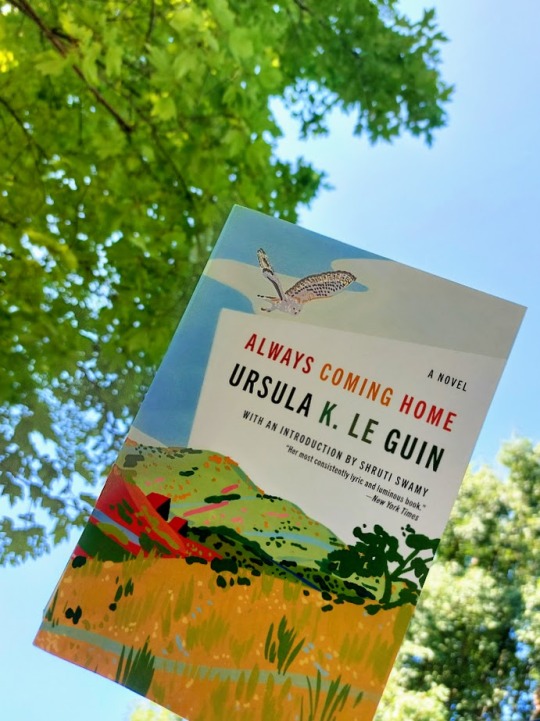
Books of 2024: ALWAYS COMING HOME by Ursula K. Le Guin.
The people have Spoken, so I'll be reading this 618-page brick next! The cover page credits the author, an artist, a composer, a geomancer (??), and the author of the intro, so. I suspect I'm in for a Ride™. I am both Excited and Intimidated--will report back on how this goes!
#books#books of 2024#always coming home#ursula k. le guin#book photo#book photography#anyway yeah this counts as Driscoll Adjacent for my writing project needs because ~post apocalyptic community~#the back cover says 'the kesh are a peaceful people who reject governance and the constriction of gender' so like. promising.#also 'maintain a healthy community in which everyone works to contribute to its well-being'#it's a fictional ethnography which is why it's intimidating lol#i read about how she opened this book in one of her other books lol. an essay collection i think#the tenses are wild right off the bat#'the people in this book might be going to have lived a long long time from now in northern california'#like ma'am. please.#i am but a humble little writer working a mind numbing office job. you want me to do WHAT with my brain.#anyway. excited but Intimidated#the book does lay open flat pretty well at the midpoint though that's promising (i've been having wrist in bed issues)#(i've been having wrist in general issues but i usually read lying down in bed)
21 notes
·
View notes